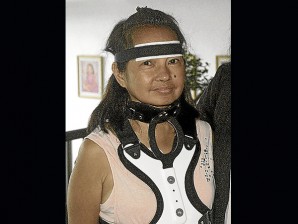The Sandiganbayan has barred former President and now Pampanga Representative Gloria Macapagal-Arroyo, her husband and two of her former officials from leaving the country.
But the antigraft court also deferred the possible issuance of warrants for their arrest in connection with cases stemming from the controversial National Broadband Network deal (NBN) with China’s ZTE Corp.
Asked to comment, President Benigno Aquino III’s spokesperson Edwin Lacierda said Malacañang considered the hold-departure order on Arroyo et al. a “further step toward the successful prosecution of justice.”
“We are aware that there is a Supreme Court case questioning the watch-list order of [Justice Secretary Leila] de Lima,” Lacierda said in reference to the motion of the Arroyo camp asking that the order be voided.
He said the hold-departure order of the Sandiganbayan would “guarantee that in the event [the watch-list order] is rendered unconstitutional, the departure of Ms. Arroyo would be prevented.”
In a resolution issued Tuesday, the Sandiganbayan fourth division held in abeyance the determination of probable cause in the criminal charges against Arroyo and her coaccused, saying the Office of the Ombudsman did not complete the preliminary investigation before filing the cases in court.
Those charged with one count of graft along with Arroyo were her husband, Jose Miguel “Mike” Arroyo; Benjamin Abalos, a former chairman of the Commission on Elections; and Leandro Mendoza, a former transportation and communications secretary.
They were indicted in connection with the approval of the $329-million NBN-ZTE deal, which was found to be disadvantageous to the government and ultimately scrapped.
In a separate resolution issued on January 2, the Sandiganbayan issued a hold-departure order on Arroyo and her coaccused.
The order, a copy of which was given to the Bureau of Immigration, prevents all the accused from leaving the country without the court’s permission.
Reconsideration
But the Sandiganbayan gave the accused the opportunity to file motions for reconsideration on the Office of the Ombudsman’s resolution indicting them, and said not to do so would violate their right to due process.
Arroyo is also facing another graft case, as well as a case for violation of the code of conduct and ethical standards for public officials. All cases are bailable.
But Arroyo and Abalos have been arrested for the nonbailable charge of electoral sabotage. The case is pending in the Pasay City Regional Trial Court.
Arroyo is being held at Veterans Memorial Medical Center in Quezon City, and Abalos, at the Southern Police District headquarters in Taguig City.
The same day
The determination of probable cause is required before an arrest warrant can be issued.
In ordering the deferment, the Sandiganbayan said it appeared that the accused were not given copies of the Ombudsman resolution before criminal charges were filed in court.
The antigraft court noted that the resolution was approved on December 28, the day the charges were filed. It said copies of the resolution were mailed to the accused on the same day but that under normal circumstances, they could not have received the copies on that day itself.
Also, the court said, the five-day period for the accused to file a motion for reconsideration on the Ombudsman resolution had not lapsed before the cases were brought to court.
“A full and complete preliminary investigation guarantees to criminal respondents the right to seek a reconsideration/reinvestigation of the Office of the Ombudsman’s adverse resolution at the preliminary-investigation level within the period prescribed by the rules, and the failure to afford criminal respondents the opportunity to exercise such option violates their right to due process of law,” the Sandiganbayan said.
Thus, the accused should be given the chance to seek reconsideration of the resolution if they wish to do so, it said, adding:
“Without a full and complete preliminary investigation, which includes the right to file such motion for reconsideration/reinvestigation, the filing of these cases before the Sandiganbayan would be premature.”
On Monday, Mendoza filed a motion for reconsideration in the Office of the Ombudsman, where he defended the NBN deal.
No flight risks
The Sandiganbayan also said the Office of the Ombudsman had failed to show that the cases brought against Arroyo and her coaccused were among those that could be filed immediately under the agency’s Office Order No. 12, which was issued in 2004 regarding the limited application of the rule on the immediate filing of information.
The court said that under this order, the cases that could be filed immediately were limited to those involving nonbailable offenses as well as bailable offenses if there was sufficient indication of the possible flight from justice of the accused.
“Although [the current] cases involve bailable offenses, there is no showing, much less any statement in the record, alleging that the accused are flight risks at this time,” it said.
The court also said that if the accused had already filed the motion for reconsideration, and even if this was filed outside the prescribed period, the prosecution should resolve the motion, considering that the cases were “precipitately” filed. It has 15 days to resolve the motion.
If the accused have not yet filed such a motion, then the prosecution should furnish them copies of the resolution and afford them the original period permitted by the rules within which to file the motion, the court said.
The prosecution should resolve the motion within 30 days from notice of its order giving the accused the opportunity to file the motion.
To be fair
The resolutions were signed by Justice Gregory Ong, the chairman of the fourth division, and Justices Jose Hernandez and Maria Cristina Cornejo.
Lacierda said Malacañang expected Ong and the other justices of the Sandiganbayan’s fourth division “to be fair-minded and to appreciate evidence objectively and independently of any political affiliation or background or whoever appointed them.” With a report from Christine O. Avendaño and Tetch Torres, INQUIRER.net
Originally posted: 12:03 pm | Tuesday, January 3rd, 2012
